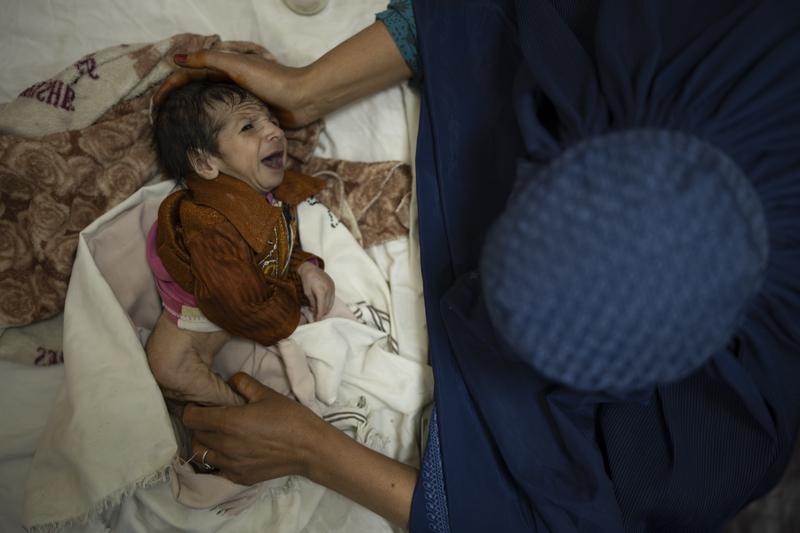 Sofia cradles her 2-month-old baby, Abdul, as he undergoes treatment at the malnutrition ward of the Indira Gandhi Children's Hospital in Kabul, Afghanistan, Tuesday, Oct 5, 2021. Health workers in the hospital dashed back and forth caring for gasping premature newborns and others suffering from severe malnutrition and other diseases. (FELIPE DANA / AP)
Sofia cradles her 2-month-old baby, Abdul, as he undergoes treatment at the malnutrition ward of the Indira Gandhi Children's Hospital in Kabul, Afghanistan, Tuesday, Oct 5, 2021. Health workers in the hospital dashed back and forth caring for gasping premature newborns and others suffering from severe malnutrition and other diseases. (FELIPE DANA / AP)
ISLAMABAD - The world should urgently provide promised aid to Afghanistan, the UN refugee agency said on Saturday, warning that a lack of resources is hampering efforts to avert an economic crisis that could push fresh flows of refugees to its neighbors and beyond.
"The humanitarian crisis in Afghanistan remains really dire," Babar Baloch, spokesperson for the UN High Commissioner for Refugees, said in an interview in Islamabad.
The total needed for humanitarian operations in Afghanistan in the next few months is $600 million and only 35 percent of that had been provided by international donors, despite promises at a recent conference in Geneva where donors pledged more than $1 billion in aid
"The focus has to be inside Afghanistan to avoid and avert another refugee crisis."
Since the Taliban took over Afghanistan on Aug 15, the country - already struggling with drought and severe poverty from decades of war - has seen its economy all but collapse.
ALSO READ: US, Taliban to hold first talks since Afghanistan withdrawal
Most of the nation's international assistance has been cut off, though there are exceptions for humanitarian aid. Billions of dollars in central bank assets held abroad have also been frozen, which has put pressure on the banking system.
"Our worry is Afghan suffering will increase, the impact will be inside…but also it could be beyond Afghanistan…in terms of displacement not only to countries like Pakistan and Iran that have been generous hosts of refugees for decades, but beyond."
The total needed for humanitarian operations in Afghanistan in the next few months is $600 million, Baloch said, and only 35 percent of that had been provided by international donors, despite promises at a recent conference in Geneva where donors pledged more than $1 billion in aid.
"Those pledges have to turn into reality, the cash has to be there for us to step in and support...Afghans," he said.
ALSO READ: At risk of blackout, Afghanistan asks UN to pay power bills
Baloch added there were new challenges since the collapse of the government and the takeover of the country by the Taliban administration. The lack of commercial flights meant supplies needed to be taken in on special flights or by road.
He said a humanitarian hub had been set up in Uzbekistan to fly in supplies which were then driven across the border into northern Afghanistan.
UN agencies are engaging with members of the Taliban administration, he said, adding there were some positive signs but one key issue was ensuring female local staff were able to get back to work in all parts of the country.
In Qatar, Taliban representatives asked the United States to lift a ban on Afghan central bank reserves at a meeting with US counterparts, Afghanistan's acting foreign minister said on Saturday in remarks reported by Al-Jazeera television.
READ MORE: WHO: Virus testing, vaccination declined in Afghanistan


